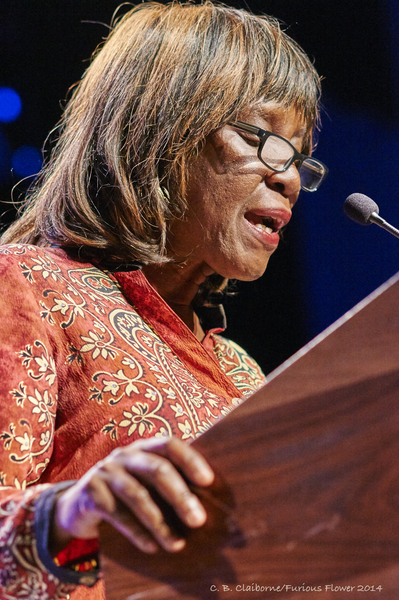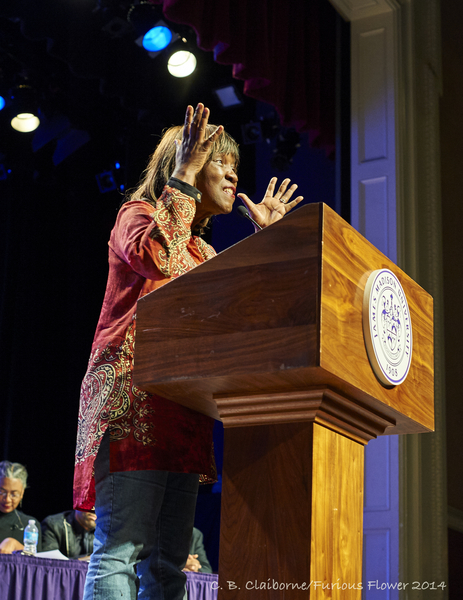Patricia Smith: Golden Wordwoman
Newsby Brittany Fisher
No one expresses the brutality and the kinship of African American culture, and exposes the demons that human souls harbor, quite like poet, playwright, and fiction writer Patricia Smith. In her poetry from the early 1990s to the present day she has dealt with some of the most controversial and untouchable topics, breaking boundaries and taking full advantage of her freedom of speech. She carries us from a bloody back alley in the projects to a daddy plaiting hair in the kitchen all in one sitting, leaving us shuffling through more emotions than we knew we had, and she does not apologize for it.
Born and raised in Chicago, Smith was greatly influenced by the slam poetry movement in the late 1980s, during which she found her voice. In pursuit of a career in journalism, however, she moved to Boston, where she went to work for the Boston Globe after 1991. Around that time, she also began striving to make slam poetry a national epidemic.
During the Furious Flower Poetry Conference held at JMU in the fall of 2014, Smith’s presence was both serene and fierce. On Sept. 25, she sat onstage at the Wilson Hall Auditorium in a tribal themed shirt and jeans, her short, sepia-colored bob reflecting the bright stage lights. Shuffling through her papers, Smith seemed anxious. Anxious to speak. Anxious to teach.
 Upon introduction, she walked to the podium, naturally squinting her eyes. She read several poems leading up to her piece entitled “The Five Stages of Drowning.” She explained that two young black girls, toddlers who were both murdered by their fathers, had inspired this poem. Smith proceeded to pierce the audience with line after line of stinging doses of reality.
Upon introduction, she walked to the podium, naturally squinting her eyes. She read several poems leading up to her piece entitled “The Five Stages of Drowning.” She explained that two young black girls, toddlers who were both murdered by their fathers, had inspired this poem. Smith proceeded to pierce the audience with line after line of stinging doses of reality.
The five stages of drowning: surprise, involuntary breath holding, hypoxic convulsion, unconsciousness, and clinical death. In the first stage, Smith describes a little girl named Zara, trapped and wriggling inside a sack. The poem highlights the girl’s innocence and how completely oblivious she is to her unavoidable fate. Smith spoke knowingly: “Babies accept what they are given.”
The poem went on, submerging us in the feeling that we were standing by, slowly watching these little girls drown, unable to do anything to stop it. In the end, Smith recited the closing line, “…the river says it for her. Goodbye.”
The room remained silent as the audience tried to process the panic Smith had just injected into the atmosphere. It was as if no one wanted to break it for fear that the next poet would begin, the show would go on, and these dead children would simply be forgotten.
That poem played through my mind for the rest of the evening. It was impossible to forget.
. . .
Smith was nominated for a Pulitzer Prize in journalism in spring of 1998. However, after rumors that some of her work in the Boston Globe had been fabricated, she was withdrawn from consideration. She admitted her faults and lost her job at the paper. She experienced cruel public backlash from national mainstream press and several TV panel shows. Although this controversy pushed her closer to pursuing performance poetry on a regular basis, it permanently tainted her career in journalism, strained her marriage, and caused heavy emotional trauma that led to medical issues. However, by the end of 1998 Smith had bounced back from the incident and used the experiences to renew her performance poetry. The experience lent itself to her art.
Smith is big on teaching. The majority of her work is concerned with black culture and her personal experiences in it. In an October 2014 interview with Reginald Dwayne Betts for the Able Muse Review, she explains her process of encouraging non-blacks to relate to her poems. She refuses to dismiss the lack of understanding of the African American culture in other races, and emphasizes the fact that people must be taught. She says that her job is to be true to herself, speak what she wants, and make what’s important to her important to the listeners.

As a poet, Smith focuses on the issues she feels need to be heard. Recently, she explained this to Tameka Cage-Conley of Sampsonia Way: “Usually when I enter that space it’s because I think the story has some urgency to it. I have to think that in every audience there’s one person who is going to be moved by the poem but I don’t know who that person is so I have to assume that it’s everyone.”
In her Furious Flower performance, Smith took particular stories of real people and used them as eye openers for the evils that take place in our world. Her poems force us to dwell on how we tend to ignore tragedies that don’t affect us, and then to acknowledge these catastrophes. “There are stories that we are not talking about and I think it’s up to the artist to talk about them,” she told Cage-Conley.
Through the years, much of Smith’s poetry has provided the handle on a looking glass that most people wouldn’t dare gaze into. She does not sugarcoat her thoughts nor does she put a filter on what she desires to say. This is the most captivating aspect of her work: The brutal honesty in every line, whether it breaks you down to tears or goes ten dirty rounds with your conscience, makes you trust her as a writer. It digs deep into the soul and acts as reassurance that her voice is important, and that there is a need to hear what Patricia Smith has to say. There is truth to be told.
Brittany Fisher is a senior majoring in Media Arts and Design with a concentration in Journalism at James Madison University. This essay has been adapted from a class assignment for Dr. Joanne Gabbin’s English 362, African American Poets (Fall 2014), and reprinted with permission.
Photos by C. B. Claiborne.
You might also like to read these other reflections from students: “Seeking Komunyakaa” by Austin Shifflett and “In the Company of Poets” (selections from several writers).

